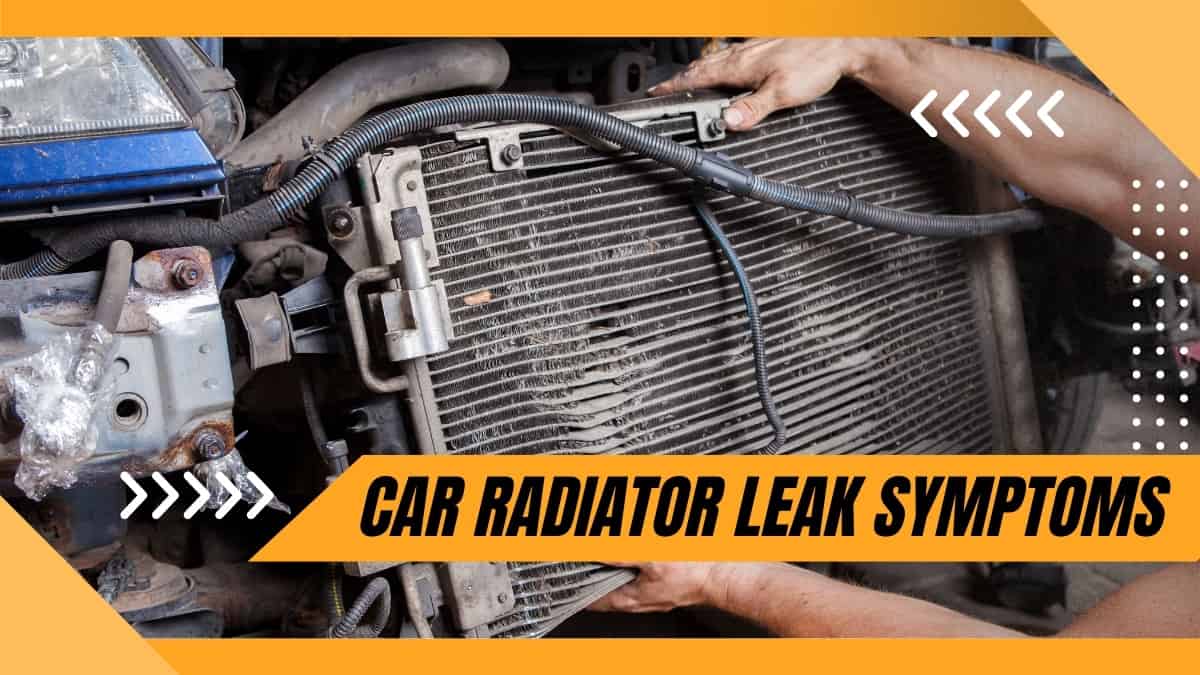
If your car radiator is not working as it should and you suspect it to be leaking but are not completely sure then this article on Car Radiator Leak Symptoms is going to help you!
What happens when athletes are running a 50 km marathon? They exhaust and are constantly provided water and drinks while they are running. A similar situation occurs with a car. An engine is the heart of a car. While it is constantly running, keeping it cool to function well is essential.
A car’s engine generates the necessary power through the combustion of fuel and the energy generated by the many moving parts. The engine can become very hot because of its movement and power. The engine must release this heat while running to avoid overheating, which might result in significant damage.
A car radiator is what helps in the removal of the engine’s overheating. It is a crucial component of the cooling system that aids in removing surplus heat generated by the engine.
However, there are cases when the radiator is leaking, and the engine soon starts to overheat. In this blog, we will consider the car radiator leak symptoms so that one can detect it timely and prevent the engine from malfunctioning.
How do you detect whether your radiator is leaking or not? Let us identify six signs that tell us if the car radiator is leaking.
The radiator is essential to control the temperature of the engine. Damage to the tubes in the radiator that transport the coolant will inevitably result in leaks and an overheated engine.
If this problem is not fixed, it will eventually cause your car to malfunction. Let us first identify some signs that tell us if the radiator is leaking so that we can prevent it from damaging even further.
Engine overheating is one of the most common and a warning sign that car radiator service or car radiator repair is required. When the engine becomes too hot, high levels of smoke usually come out of your car. This often causes the car to break down suddenly with you stranded on the road.
It is strongly recommended that one shouldn’t drive the car any further once the engine overheats as it might cause damage to the engine.
The radiator in your car’s engine is filled with “coolant,” a 50/50 mixture of water and an antifreeze liquid. Regardless of the outside temperature, a pump on the engine circulates coolant through the radiator, heater, and engine, which helps to keep your engine running at the right temperature and prevent it from overheating.
An engine’s performance and fuel efficiency will suffer if the coolant level is low. This can inflict expensive repairs and potentially lethal damage to your car.
Have you ever noticed a puddle of liquid under your car when the car is stopped for a long duration? It might be the case that the coolant is leaking. Even if it is, how will you identify that the liquid leaking is the coolant? Coolant is the lime-green, orange, bluish-green and pink-coloured liquid that feels like slimy water and has a sweet smell.
Radiators are usually made up of metals and plastic. As the plastic is brittle, the same might cause coolant leaks. If you observe the coolant falling on the ground, it is likely leaking from the radiator, and you must call a professional mechanic for help.
There might be ancillary or related problems such as the car heater not working, the expansion tank having a lesser coolant level, the coolant warning light glowing etc. All these problems suggest that the coolant level might be leaking, and this leak is one of the most important ones of all car radiator leak symptoms.
Vehicle coolant typically has a colour of bright yellow or green. It can occasionally be pink or red. It quickly travels between the radiator and the coolant passages found inside your car’s engine.
Deposits and sludge can contaminate a poor radiator’s coolant, making it rusty and, sometimes, making it appear like oil. It may also seem thicker due to contamination. The flow is hampered by this, which results in a clogged radiator.
The radiator may get discoloured or corroded if there is a coolant leak. Examine the radiator’s underbelly and any nearby engine components. A radiator flush might be the best option to prevent this situation.
Rising air pressure in the cooling system, shown by bubbling, is a symptom that a pocket of air obstructs the liquid’s flow. This escaping air generates bubbling, which is sometimes mistaken for boiling, in the coolant reservoir.
Air progressively enters the cooling system, reducing the liquid pressure and causing the fluid to boil and, eventually, reach its boiling point. This causes overheating quickly, and white vapour may be seen coming out from under the hood. Hence, the fluid that has reached its boiling point will boil, overheating the engine.
So, whenever you see bubbles coming out of your radiator, it is best if you get your car serviced to avoid further damage.
We know that to prevent overheating, a coolant is necessary. The expansion tank, a plastic container housing this coolant, is positioned close to the engine. A rubber hose connects the expansion tank to the radiator. This hose receives the coolant from the radiator when the engine heat ups and sends the coolant to the radiator when the engine cools down.
When the car is exposed to variations in temperature and time it may worsen the plastic container, which could cause coolant to leak from the tank. Also, there might be a chance that as the hose attaching to the radiator begins to degrade, it becomes loose and lets fluid out.
Maximum airflow is required for proper cooling of radiators. The narrow front tubes of the radiators, which resemble fins, transport the heated coolant away from the engine. Air flows over the fins while you drive, bringing the coolant’s temperature down. If these fins get blocked with dirt, bugs or other debris, it may hamper the airflow. As a result, the coolant won’t cool down as it should.
It’s also conceivable that you have harmed the fins. Fins are very delicate. Due to their fragility, any flying dust particles could cause damage to it. Damaged fins can cause a radiator to clog, leading to engine overheating.
A leaking radiator is caused due to a lot of reasons. Some of these reasons are corrosion or damage caused to the radiator, frequent poor radiator service might have hurt the radiator, and overfilling the radiator may also cause radiator leaks due to the high pressure of water. Other causes include a bad thermostat causing a leak in the radiator, etc. Once you realize your radiator is leaking, you should immediately consult a professional mechanic.
The critical question that arrives here is whether you can drive a car with a radiator leak or not.
The answer to the above question is yes. As the radiant is not functioning well, your car will quickly start to heat because it is not receiving the coolant. One can still drive the car for a short duration when the radiator leaks.
The overheating of your car might damage the engine. Hence, it is wise to stop your car when you see your engine is heating and get help from a professional.
The easiest solution is to visit a good car repair shop or call a mobile mechanic, and once he detects a problem with the radiator, you must get the car radiator repaired.
A leaking radiator leads to low coolant levels in your car, resulting in an engine overheating. Due to the overheating, exhaust valves may burn, and a block or head may shatter.
The overheating can potentially result in the head gasket failing and driving with a damaged radiator results in more damage and expensive repairs.
It’s better to stop and let the car cool off if you detect that your engine is getting too hot. If you can’t use it at a normal temperature, it should be hauled to a nearby shop.
Radiator replacement typically costs approximately $800. However, that cost might greatly vary based on the year of purchase, model of the car and date of manufacture.
A head gasket is situated between the cylinder head and the engine block. A car’s engine is separated into two parts:
Between them is where the head gasket exists.
A head gasket’s purpose is to prevent internal and external cylinder leakage of engine oil and coolant. It also serves to seal the cylinders’ firing pressure. The pressures brought on by the two tops, contracting, expanding, and rubbing against each other while the in-cylinder pressure is sealed, engine oil and coolant flowing via casting ports must not damage the head gasket.
When your engine overheats, the head gasket can get blown. A head gasket damage results from the engine block and cylinder head expanding excessively due to the added heat.
The following are some symptoms of a damaged head gasket:
If you notice any of these signs, the cooling system may be under pressure. Please turn off the engine and don’t try to depressurize it.
You may have a radiator leak if you smell anything strange and sweet emanating from your automobile after turning off the engine. The vehicle begins to overheat. The clues for you to know if your car has developed a radiator leak are:
Smoke emerging from the radiator is a sign that the radiator has failed to perform as intended and that the automobile is overheating.
A head gasket failure, a cracked cylinder head or a damaged engine block brought on by overheating are some common reasons for the white exhaust smoke.
Your car’s radiator leaking will lead to engine overheating and can seriously harm your engine. Consider the car radiator leak symptoms so that you can detect it quickly and prevent the engine from malfunctioning.
The most common sign of a leaking radiator is engine overheating. A pool of water next to the engine and coolant levels rapidly declining are other two signs that are frequently noticed. These three signs are all related to coolant leaks. Checking the water and coolant levels in your automobile radiator every two weeks or so is the most accessible approach to determine if you have a coolant leak.
Your engine will continue running for a while if you’re willing to keep filling off the radiator, but as soon as the symptoms worsen, the engine will stop working altogether. It’s recommended that once you’ve identified one of these signs of a car radiator leak, you shouldn’t drive at all. It is best to talk to a Radiator specialist or take your car to a car radiator service so that you don’t damage your car further.
Fill out the contact form and we will call you as soon as possible discuss events, membership or any general enquiries.
